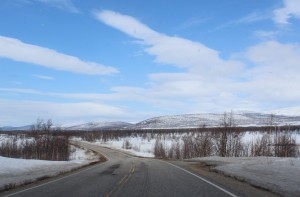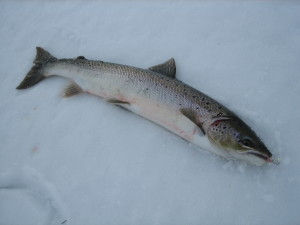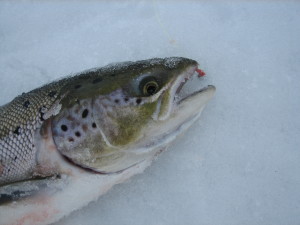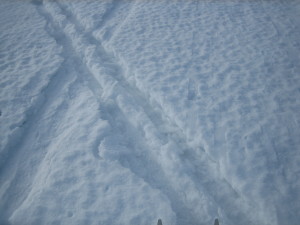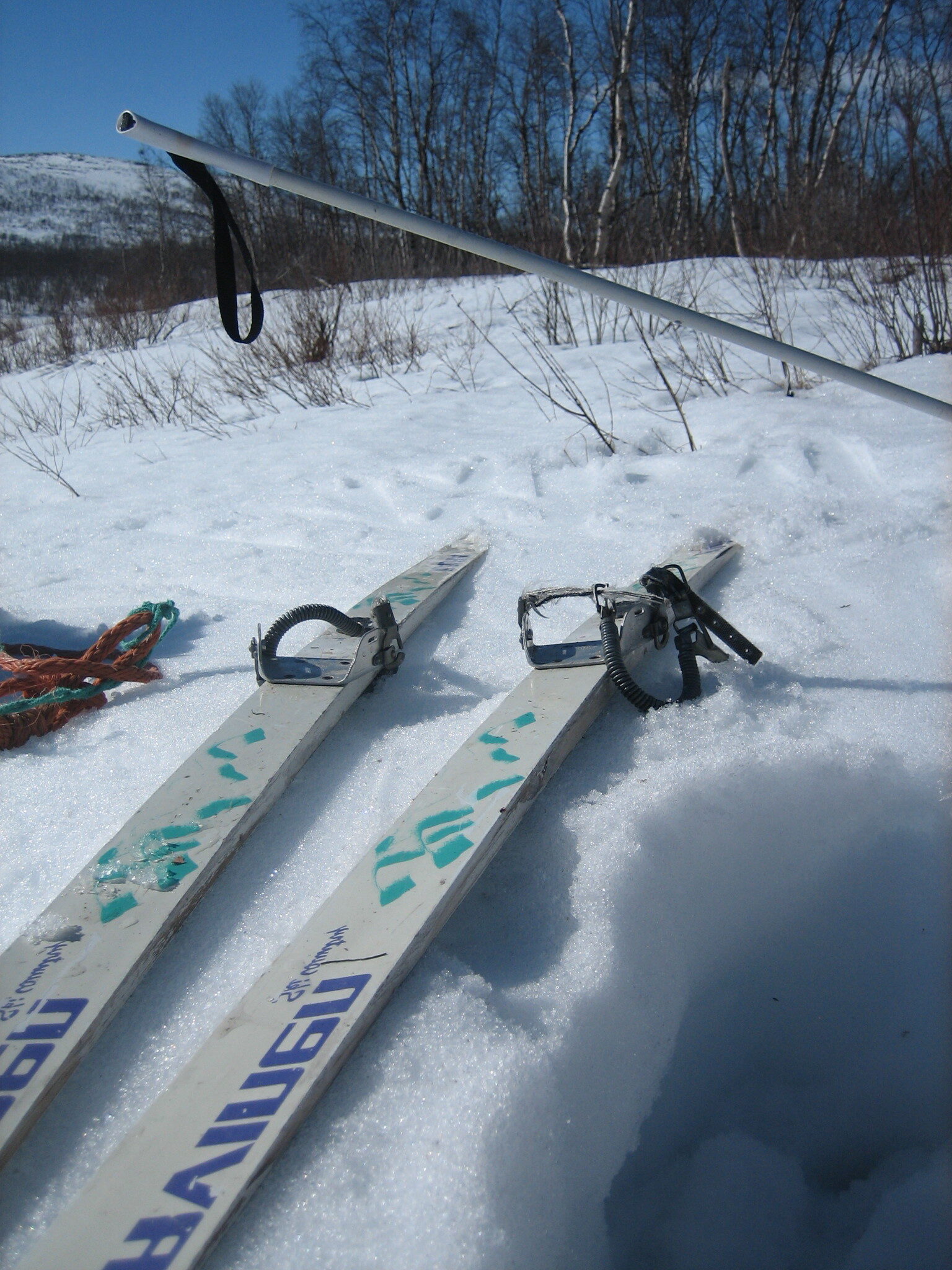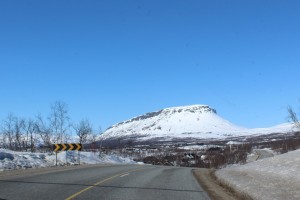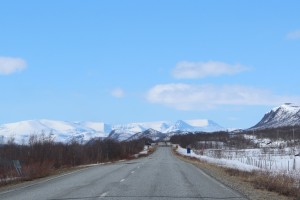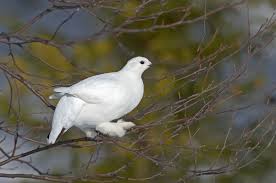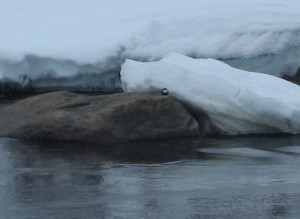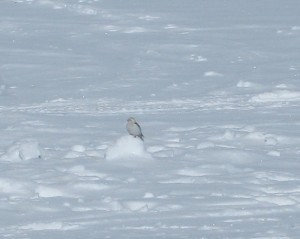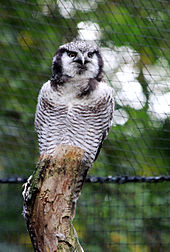After a 5 hours’ drive along the Northern Light road which mostly follows the border between Sweden and Finland we arrived to Ropinsalmi in the municipality Enontekio in the north of Lapland, Finland. The nature and surrounding start to change from “normal” nature to fell nature after 3 hours’ drive. The fells of Finland and especially the beautiful fells of Sweden can be seen through the car’s window during the drive. Especially if the sun is shining on snow-covered fells the sight is breathtaking. The colors are mainly white, blue and brown.
As you can see from the picture the road was dry and not covered with snow anymore. The spring time has come to Lapland. Still the ice on the river Torniojoki-Muonionjoki-Könkamaeno was about 70-80 cm thick.
After checking in and changing of clothes we immediately aimed to the ice-fishing area; first by car and the last part of the journey by skis. The first day’s transport to the ice consists of a motor auger, a hand auger, a shovel, stools for everybody, some utensils for the fire making and of course many different fishing rods and shovels to take the ice from the holes.
The strongest person in the expedition starts making the holes with the motor auger. That is definitively not a job I could do. The auger is heavy and as it starts to drill you must have complete control of the auger and keep it in its place. My job is limited to opening the holes in the mornings with a hand auger as the nights are cold and the holes are frozen in the mornings. That is a much easier job with ice of 1 or 2 cm.
This year’s expedition starts in the best possible way. After little more than an hour there is a big catch on one of the rods. No-one knows what is on the hook; we cannot see the creature, we can only follow its moves as it struggles to get itself free from the hook, and those are really strong ones! The procedure now is to try to get the fish so tired that it will be possible to lift it up through the hole without breaking the hook nor the line and loose the fish. That stadium happens after a process of draining the fish for about 10 minutes. But then the fish surrendered and the catcher (not me!) lifts it up on the ice. And that is a salmon (Salmo salar), 2,75 kg and 75 cm tall. A catch of a salmon at this latitude is real rare, as the salmon lives in the sea Bothnian Bay 300 km to the south from here. The Salmon jumps in the rapids up along the river, but no one could imagine they can travel this far. In the pictures you can still see the hook in the mouth of the salmon.
This night is the night of big catches as I also end up with a pike weighing about 2,5 kilo.
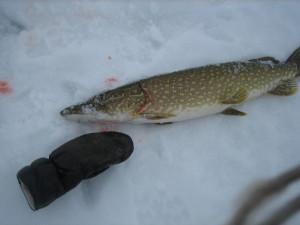
Our ice-fishing expedition lasts for 5 days of at least 10 hours of ice-fishing every day. You might think this is impossible to carry out. But I did not find it difficult at all. The days go fast and contain a lot of nature spotting, pauses at the fire-place and even shorter trips on skis in the surroundings. There are pauses during the day when the fish simply do not eat and then it is suitable for the fishermen to also take a break and do something else, such as rapid spotting. The rapids are not far away from the fishing place.
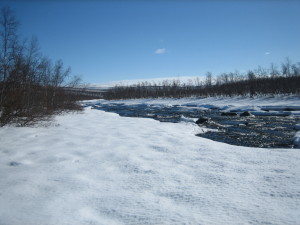
The weather during this expedition is perfect every day with little wind and modest temperatures. Starting the first day with some degrees above zero and getting colder towards the end of the period. To go skiing on snow half a meter deep at this time of the year usually happens on hard snow and you kind of “fly” away along the snow. But in an evening after a whole day of degrees above zero, the snow gets softer and does not carry a skier any more. And that was what happened to us the first night. We sank into the snow about 30 cm at the most and it was a struggle to get to the fishing place. But as the weather conditions changed and the temperatures got colder later during our stay the conditions for skiing got better and better. Here is a picture from three different days of skiing tracks. You can hardly see the last track; when the snow was so hard there were no tracks at all made from the skis.
On the first two warm days the conditions on the ice was also a bit challenging with water on the ice and uncomfortable to move around.
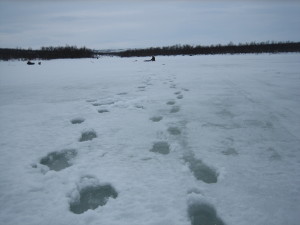
But the conditions changed and at the end it was just perfect with sun shining from a blue sky and hard snow to move on made it so much easier for us.
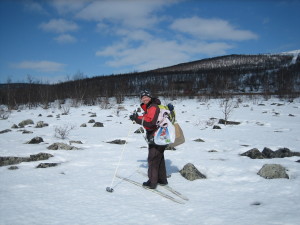
The catch consisted of 1 salmon, some pikes, some whitefish and a lot of greylings. We wanted especially a lot of greylings as they are very tasty and not so easy to catch on other places where we use to do ice-fishing. And a surprise like a trout or even a salmon is always the bonus of the expedition!
One day during the expedition we always make a trip to the place Kilpisjarvi in the north of Finland, near the place where the borders from Norway, Sweden and Finland meet. This year was no exception and the weather in Kilpisjarvi was perfect as always. The Saana fell was shining in the sun and the surrounding Swedish fells were absolutely white from snow even if the amount of snow on the ground in Kilpisjarvi was not exceptional much.
As I sit by the hole waiting for some catch I use to observe the nature and different sounds from the nature. During these days I saw flying swans, two species of the northern hawk-owl (Surnia ulula), two species of the white-throated dipper (Cinclus cinclus), a lot of snow buntings (Plectrophenax nivalis) and I heard the sound of willow grouses (Lagopus lagopus) from the bushes of fell birches (Betula pubescens ssp. tortuosa) nearby.
These pictures are of a white-throated dipper and a snow bunting taken of me with my camera that does not have a lens that can take closer pictures.
The meeting with the hawk owl was the first one ever for me. The hawk owl is a non-migratory owl that usually stays within its breeding range. It is one of the few owls that is neither nocturnal nor crepuscular, being active only during the day.
This year’s expedition was a success and I am glad I was able to make it.

